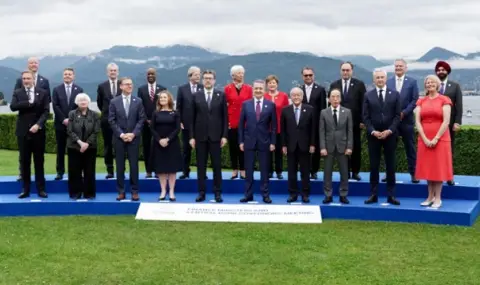G7 leaders gather this week in southern Italy for their annual meeting, and although they are in a gloomy mood because of their myriad troubles at home, they are trying to find solutions to many of the most painful global problems.
US President Joe Biden, who is running for re-election in November, faces a polarized electorate and his poll results are dismal. At the same time, it seems certain that British Prime Minister Rishi Sunak will lose power in next month's general election.
The leaders of France and Germany are in an unstable situation after their heavy defeats in the European elections, the results of the sociological polls for the prime ministers of Canada and Japan are also gloomy.
Only the summit host – Giorgia Meloni is holding her head high after her triumph in Italy's European elections, but political analysts say she faces difficulties in achieving meaningful results in the luxury resort of Borgo Egnatia.
"As host of the G7, she wants to meet fully empowered leaders. You can't achieve much if you only have lame ducks in front of you,'' said Francesco Galietti, founder of the political risk research company Polisi Sonar. "How can you have authority on the world stage if you have no authority at home," he asked.
At the June 13-15 summit, the leaders of the world's most advanced democracies face a threatening agenda. It includes the wars in Ukraine and the Middle East, trade imbalances with China, the dangers posed by artificial intelligence, and development challenges in Africa.
In addition, they will welcome an unusually large number of guests from countries not part of the format, such as Pope Francis and the leaders of some of the biggest powers around the world, including India, Brazil, Argentina, Turkey, Algeria and Kenya. Saudi Arabia's Crown Prince Mohammed bin Salman was also expected to attend, but he canceled his participation on Tuesday without giving an explanation for his decision.
"The G7 brings together leaders of countries who share the same views on fundamental principles and standards, but the format is not closed like a fortress. It is open to the world," said a high-ranking representative of the Italian government, who wished to remain anonymous.
RUSSIAN ASSETS FROZEN
En route to the summit, which began today, diplomats are trying to overcome legal hurdles that prevent the West from using accrued interest on frozen Russian assets.
About 260 billion euros of the Russian central bank are blocked worldwide, mainly in the EU.
Some European governments want the interest seized and used to help Ukraine, which has been devastated by the Russian invasion that began in 2022. However, the US has a more ambitious plan and proposes that the interest be used to service a long-term loan in the amount of nearly 50 billion dollars.
"Money is of course important, but it is also a signal, because this year our leaders have the opportunity to give an unmistakable signal that Russian President Vladimir Putin is not more resilient than us," said last week the leading American diplomat Dalip Singh on the occasion of the G-7 negotiations.
Rome and Washington hope an agreement can be reached in Puglia, but last week a German representative said that was unlikely.
Despite ongoing friction on this issue, there is almost unanimous agreement among the G7 partners on the need to stand up to Russia, and for the second year in a row Ukrainian President Volodymyr Zelensky will attend the summit.
There is less harmony in the club of rich countries when it comes to the war between Israel and Hamas, with EU countries divided between hard-line pro-Israel and pro-Palestinian countries.
Differences will also emerge when Western allies begin to condemn China. G7 leaders are expected to raise concerns about China's industrial overcapacity, but there is still no agreement on the best way to counter Chinese state subsidies.
"Some European countries have very intense trade ties with China, so we should expect less unity than on other issues like Russia," said Raffaele Marchetti, professor of international relations at the International University of Social Sciences " Guido Carli" in Rome.
Translation from English: Nikolay Velev, BTA
